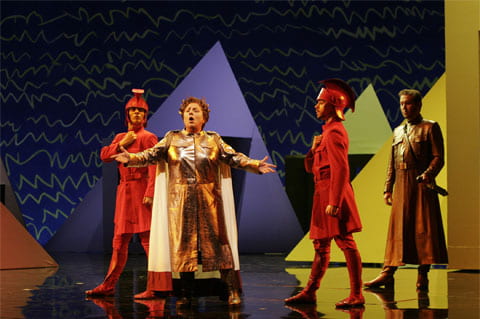Polish Music Center Newsletter Vol. 13, no. 3
Szymanowski Year
Szymanowski And Modern Music In Poland
Polish music in the nineteenth century was dominated by the huge shadow of Chopin’s legacy, whose innovative piano textures, bold harmonies, and a perfectly balanced blend of national and international elements established an iron-clad formula for other Polish composers to follow. It is important to note that although Chopin was born in Poland, he spent one half of his life in Paris, a city that was just emerging as a great center of modern musical life. Whilst retaining the national characteristics, Chopin’s Parisian opus also belonged to the European musical avant-garde of the time.
Generally recognized as the most important Polish music figure after Chopin, Stanisław Moniuszko (1819-1872) was a more provincial and less innovative composer, who spent most of his life between Vilno and Warsaw. Nonetheless, Moniuszko’s legacy is of great importance: he is still the most popular operatic composer and a revered author of hundreds of beautiful songs with piano accompaniment.
Polish composers of the second half of the nineteenth century belonged to a somewhat different sphere—for the most part they were touring virtuosi, who in many cases wrote music for use in their own performances. Henryk Wieniawski (1835-1880) was a violinist, whose phenomenal technique and prolific gift of melody are on ample display in his graceful and dazzling compositions. Juliusz Zarębski (1854-1885) was a brilliant pianist and a favored student of Liszt. Zarębski’s early compositions are clearly modeled after Chopin, but his last works are much closer to French and German music of the late 1800s. Ignacy Jan Paderewski (1860-1941) was perhaps the best known Polish musician of all time. He toured the world as a piano virtuoso and also served briefly as Poland’s Prime Minister after the end of World War I. In his youth he composed a great deal of salon music that shows a strong imprint of Chopin. Zygmunt Stojowski (1870-1946)—Paderewski’s pupil and close friend—was perhaps the last Polish romantic, who carried into the twentieth century the ideal of beautiful melodies and chopinesque harmonies that permeate his solo piano and orchestral compositions. Two other Polish composers of the era include Władysław Żeleński (1837-1921) and Zygmunt Noskowski (1846-1909). Both of them were stylistically influenced by Moniuszko. Żeleński is considered to be the follower of Moniuszko’s operatic traditions, while Noskowski is chiefly remembered for his symphonic music. The two were not only prominent teachers but were also highly respected for their compositional achievements. With the passage of time however, their works have disappeared from concert repertoire.
The first Polish composer to forge a new path in Polish music was Mieczysław Karłowicz (1876-1909). A student of Noskowski in Warsaw and Heinrich Urban in Berlin, he was a distinguished symphonist whose highly individual style reflects the influence of Richard Strauss and Gustav Mahler. All of his symphonic poems and other large-scale works (like the Violin Concerto or the Symphony) remain to this day in the repertoire. Karłowicz was also associated with the “Young Poland” group—a movement in music, art and literature active from the 1880s to the early 1920s—that sought to fuse modernist means of expression with the national characteristics. Surveying it from the vantage point of today, the Young Poland group sought to bring Polish music of the early twentieth century the same degree of recognition and modernity as Chopin’s music did a century earlier. Yet, their noble aims were not universally recognized or acclaimed. Other composers associated with the Young Poland movement included Grzegorz Fitelberg (1879-1953), Karol Szymanowski (1882-1937), and Ludomir Różycki (1884-1953). Of them, Karol Szymanowski was the most prominent, prolific, and important. Szymanowski’s special place in the history of Polish music is mainly due to the evolution of his compositional style and his lasting influence on the succeeding generations of Polish composers.
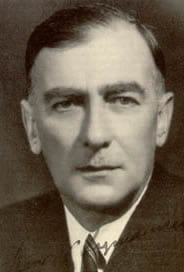 Szymanowski’s first piano compositions bear a strong kinship with works by Chopin and Scriabin. Although he studied with the preeminent Polish composer-pedagogue, Noskowski, the young Szymanowski quickly realized that, at the turn of the century, Warsaw was still an isolated cultural backwater. Until 1901 the city did not even have a professional symphony orchestra. The press was often unsympathetic to modernity in music, and a few conservative critics often attacked everything deemed to be “foreign” or “new”, seeking to rally the apathetic public. As a result, the Young Poland composers supported by Prince Lubomirski established their own publishing house in Berlin. Aiming at introducing the new Polish music to the European public, this new venture chiefly advanced Szymanowski’s first mature works—the Concert Overture Op. 12, the Second Symphony Op. 19, and the Second Piano Sonata Op. 21—and contributed to Szymanowski’s universal recognition abroad. Stylistically, Szymanowski’s music of the pre-World War I period belongs to the genre of German neo-romanticism, drawing its harmonic language from Wagner and Strauss and its countrapuntal textures from Reger.
Szymanowski’s first piano compositions bear a strong kinship with works by Chopin and Scriabin. Although he studied with the preeminent Polish composer-pedagogue, Noskowski, the young Szymanowski quickly realized that, at the turn of the century, Warsaw was still an isolated cultural backwater. Until 1901 the city did not even have a professional symphony orchestra. The press was often unsympathetic to modernity in music, and a few conservative critics often attacked everything deemed to be “foreign” or “new”, seeking to rally the apathetic public. As a result, the Young Poland composers supported by Prince Lubomirski established their own publishing house in Berlin. Aiming at introducing the new Polish music to the European public, this new venture chiefly advanced Szymanowski’s first mature works—the Concert Overture Op. 12, the Second Symphony Op. 19, and the Second Piano Sonata Op. 21—and contributed to Szymanowski’s universal recognition abroad. Stylistically, Szymanowski’s music of the pre-World War I period belongs to the genre of German neo-romanticism, drawing its harmonic language from Wagner and Strauss and its countrapuntal textures from Reger.
Szymanowski’s experience of ancient cultures and civilizations of the Mediterranean basin during his trips to Italy and North Africa on the eve of the Great War, and hearing the latest compositions of Stravinsky and Debussy in Paris were of great significance in the maturation of Szymanowski’s art. He spent the years 1914-1917 on his parents’ estate, Tymoszówka, in far southeastern Poland, digesting his travels and working his experiences into his art. Isolated from the political and military developments in Tymoszówka, he began to compose in a style of great originality that artfully fused impressionism, symbolism, and expressionism. His Mythes for violin and piano, Métopes and Masques for piano, Third Symphony, and First Violin Concerto written at that time represent a great and enduring string of masterpieces in the history of Polish music.
Szymanowski’s first composition written upon his return to Poland after the war was the 1921 song cycle, Słopiewnie. This work represents yet another trend in the evolution of Szymanowski’s musical language. Here the composer experimented with incorporating ancient folk music elements and integrating them into high art. Szymanowski’s fascination with the folklore of Zakopane and the surrounding Tatra Mountains led to several works written in this new style, especially the ballet Harnasie, the Second String Quartet, and the cycle of Mazurkas for piano. Folk elements also permeate the last movement of Szymanowski’s Symphonie concertante for piano and orchestra, written in 1932, and the Second Violin Concerto, dating from 1933.
Although the last few years of his life were spent in ill health when he practically ceased to compose, Szymanowski’s pioneering achievements were of utmost importance for the successive generations of Polish composers. Szymanowski’s great interest in European music coupled with his sensitivity of being a Polish composer gave a clear and lasting example for his younger colleagues to follow.
Fortunately, the old criticisms against modern Polish music and the more recent Communist-era accusations of “formalism” no longer apply. A more favorable artistic climate led to emergence of many great composers, like Grażyna Bacewicz (1909-1969), Witold Lutosławski (1913-1994), Andrzej Panufnik (1914-1991), Wojciech Kilar (b. 1932), Krzysztof Penderecki (b. 1933), Henryk Górecki (b. 1933), Zygmunt Krauze (b. 1938), Marta Ptaszyńska (b. 1943), and Krzysztof Meyer (b. 1943). To a large extent their art was inspired in equal measure by transformation of native elements and by placing them within the universal musical tradition. Clearly, this freedom to embrace modernity whilst maintaining a degree of artistic integrity made Polish avant-garde music very successful around the world. Such achievements were certainly possible because of Szymanowski’s strong leadership in moving Polish music away from the obsolete and provincial nineteenth century stereotypes. Today Szymanowski is universally recognized as the father of modern Polish music, whose role in securing the success of contemporary Polish music was essential.
[MZ]
Polish Music Center Concert
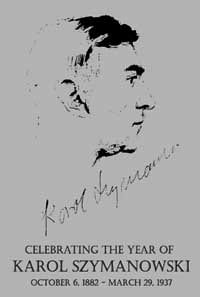
The Polish Music Center will be honoring this year’s Szymanowski anniversary with a special concert, “Szymanowski and Modern Music in Poland,” on March 22nd at 7:30pm. The concert will take place in Alfred Newman Hall at the University of Southern California. Performers will include Susan Svrček & Yevgeniy Milyazskiy, pianists; Pasha Tseitlin, violin; Yao Wang, cello; and Midnight Winds, brass/woodwind quintet. The program will feature major works by Symanowski, including the First Violin Concerto, as well as works by composers like G. Bacewicz, W. Lutoslawski and Z. Krauze who followed his lead, giving Polish music great success and prestige in the modern era. Please call 213-821-1356 or email polmusic@thornton.usc.edu with any questions about this performance.
Szymanowski & Modern Music In Poland
Thursday, March 22nd, 7:30pm
Newman Recital Hall, USC
Free
(Paid Parking available at Parking Structure X)
News
Górecki Premiere in O.C.

Kronos Quartet returned to Orange County on February 18, 2007 with the West Coast premiere of Polish composer Henryk Mikolaj Górecki’s (at left) String Quartet No. 3, Op. 67. The premiere took place at the new Renée and Henry Segerstrom Concert Hall. This piece was commissioned for the Kronos Quartet by the Carnegie Hall Corporation, the Angel Stoyanof Commission Fund, and the Kosciuszko Foundation. The Kronos Quartet members include David Harrington, violin; John Sherba, violin; Hank Dutt, viola; and Jeffrey Zeigler, cello.
Read a review of the performance in the Orange County Register here.
Penderecki At 2008 Olympics
 Polish composer and conductor Krzysztof Penderecki has been honored by a commission for a piece to be featured in the opening ceremony of the 2008 Olympic Games in Beijing. This was reported by deputy head of the Polish Olympic Committee Ryszard Parulski.
Polish composer and conductor Krzysztof Penderecki has been honored by a commission for a piece to be featured in the opening ceremony of the 2008 Olympic Games in Beijing. This was reported by deputy head of the Polish Olympic Committee Ryszard Parulski.
Chopin Complete Solo Piano Works
Ann Arbor, MI — The piano studio of Professor Arthur Greene will present the complete solo piano works of Fryderyk Chopin chronologically, from his earliest surviving work, a polonaise written at age seven, through his last mazurka penned in 1849, in a concert series running March 6 through April 14, 2007. The concert dates are March 6, 13, 20, 24, 31 andApril 7, 10 and 14th. All concerts begin at 7:30 p.m. with a pre-concert talk and will take place in the Britton Recital Hall in the E.V. Moore Building at 1100 Baits Drive in Ann Arbor. In conjunction with the final concert, an afternoon Chopin Symposium will take place on Saturday, April 14 beginning at 1:30 p.m. in Britton Recital Hall. The Symposium will feature Jeffrey Kallberg, one of America ‘s leading Chopin scholars and author of Chopin at the Boundaries: Sex, History, and Musical Genre, as well as U of M’s Mark Clague, Nadine Hubbs, and Wayne Petty. All concerts and the symposium are free of charge and do not require tickets. There is a weblog for listeners to record their impressions and comments at http://sitemaker.umich.edu/chopinproject . Further information is available at http://www-personal.umich.edu/~agreene/Chopin.html.
Professor Greene’s students come from the United States, Canada, Russia, Belarus, Moldova, Taiwan, China, Korea, Japan, and Ireland. Professor Greene feels that “rather than presenting just one person’s approach, here we will have a diverse array of backgrounds, providing a kaleidoscope of personalities. I’ll be playing some on each concert, but I have given my students most of the well-known masterpieces. For me, the most exciting things about this project are the chance to unearth fascinating and great music that never gets played, to explore Chopin to the fullest, and the chance to share the presentation of it all with my beloved and incredibly talented students.”
This event is sponsored in part by the University of Michigan School of Music, Theatre & Dance, the University of Michigan Center For Russian and Eastern European Studies, the Copernicus Endowment, and Hammell Music of Michigan. All of the performances will be recorded and distributed through the University of Michigan store on iTunes.
Open Letter To Polish Radio
Musicians and people concerned with culture have signed an open letter opposing current actions of Polish Radio which appear to be leading to the elimination of the Polish Radio Orchestra in Warsaw and the Polish Radio Choir in Kraków. Spokesman for Polish Radio, Tadeusz Fredro-Boniecki, denies that decisions regarding these groups were made.
The situation became fragile when Polish Radio announced group layoffs and included names of members of both ensembles on the list. Boniecki claims this was just a list for consideration and negotiation. Artists from both ensembles understand this as the first step to closing down two important artistic institutions within the Polish Radio organization.
Another issue touched upon in the letter regards a change in the frequency of Polish Radio Channel 2, which is a station specializing in classical music and the world of art in general. There is a concern that the move to a different frequency will affect the quality of the signal and the range of transmission, therefore limiting the potential listener base for this unique station.
Authors of the letter have created a website with complete text of the letter (in Polish) and electronic signature form to show support for these important concerns. If you would like to view the letter, signees and/or sign yourself it, please visit http://www.sygnatariusze-radio.com.
The Polish Composer’s Union (ZKP) has prepared a commentary regarding the letter. To view it, please go to www.zkp.org.pl.
70 Years Of Channel 2
![]() Channel 2 of Polish Radio celebrates its 70th anniversary on March 1, 2007. When it was first created, it was primarily a local station but it soon evolved into a station specializing in classical music and culture with a very wide audience. Although classical music became the focus point for the station, it also presents contemporary and experimental music, as well as folk and jazz. Also on the air are programs featuring literature, both Polish and international. You can listen to Channel 2 streaming online at http://www.polskieradio.pl/sluchaj/
Channel 2 of Polish Radio celebrates its 70th anniversary on March 1, 2007. When it was first created, it was primarily a local station but it soon evolved into a station specializing in classical music and culture with a very wide audience. Although classical music became the focus point for the station, it also presents contemporary and experimental music, as well as folk and jazz. Also on the air are programs featuring literature, both Polish and international. You can listen to Channel 2 streaming online at http://www.polskieradio.pl/sluchaj/
The Music & Dance Of Poland: Mazowsze
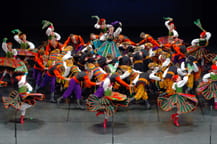 During the month of March on public television, an exciting new production will celebrate Polish culture and heritage – THE MUSIC & DANCE OF POLAND: MAZOWSZE (Click here for a preview). Th is thrilling kaleidoscopic display of dazzling movement, vibrant color and stunning beauty features the incomparable Mazowsze (Mah-ZOV-sheh) performance troupe, who whirl and leap, stamp and glide in a glorious outpouring of sound and motion, rhythm and music that celebrates the cultural legacy of Poland. Polish-American entertainer Bobby Vinton narrates.
During the month of March on public television, an exciting new production will celebrate Polish culture and heritage – THE MUSIC & DANCE OF POLAND: MAZOWSZE (Click here for a preview). Th is thrilling kaleidoscopic display of dazzling movement, vibrant color and stunning beauty features the incomparable Mazowsze (Mah-ZOV-sheh) performance troupe, who whirl and leap, stamp and glide in a glorious outpouring of sound and motion, rhythm and music that celebrates the cultural legacy of Poland. Polish-American entertainer Bobby Vinton narrates.
While the choreography and musical arrangements represent 39 distinctive ethnographic regions of Poland with traditional performance styles, the appeal of Mazowsze’s dynamic stage show goes beyond audiences of Polish descent. An ensemble of 65 dancers and singers are arrayed in a seemingly never-ending series of handmade traditional costumes — more than 1,000 in total, one more dramatic and colorful than the next and some weighing as much as 30 lbs., making their energetic gravity-defying leaps, twirls and lifts even more impressive. A full 23-member orchestra performs music ranging from Chopin to simple folk melodies beloved by the Poles for centuries. Strategically mounted high definition cameras and microphones capture this stellar performance, recorded live at the Polish National Opera House in Warsaw, Poland.
Mazowsze is internationally recognized as Poland ‘s cultural ambassadors. In the last 50 years they have performed more than 6,000 shows in cities around the world. The troupe’s founders, singer/actress Mira Zimińska and conductor/composer Tadeusz Sygietyński, dedicated themselves to preserve the rich music and dance traditions of Poland after the devastation of World War II.
This program includes the following dances: “Kolem, Kolem”; “Piekna Nasza Polska Cala”; Tramblanka Polka; Oberek; “Co Ja Mysle” – w strojach Kurpiowskich; Karnawal w Wilamowicach; Krakowiaczek; Krakowiak; Piesni i Tance z Jurgowa na Podhalu; Bamberki; Przyspiewki i tance z Podegrodzia; Winobranie w Lubuszu; Tance Goralskie z wysokich Tatr; Zywiec – Taniec z Chusteczka i chodzony; “Cyt, Cyt” w strojach Lowickich; “Furman” (solist: Stanislaw Jopek); Tance z Lowicza; Tance Sannickie; and Final. It is p roduced by WLIW New York.
National airdates in chronological order, reported as of 2/21/07, are as follows. In other cities, contact your local PBS station (www.pbs.org/stationfinder):
- WLIW: New York, NY – Th. 3/1 8:00pm
- Alaska One: Alaska – Sat. 3/3 2:30pm
- TPT2: Minneapolis, MN – Sat. 3/3 4:30pm
- KRCB: San Francisco, CA – Mon. 3/5 7:00pm
- WGBY: Springfield, MA – Mon. 3/5 9:00pm
- KBTC: Seattle, WA – Wed. 3/7 9:00pm
- WSKG: Binghamton, NY – Wed. 3/7 9:00pm
- WNED: Buffalo, NY – Wed. 3/7 7:30pm
- WVIZ: Cleveland, OH – Sat. 3/10 5:30pm
- KRMA: Denver, CO – Sun. 3/11 1:00pm
- KCET Los Angeles, CA – Sun 3/11 1:30pm
- WTTW: Chicago, IL – Sun. 3/11 6:30pm
- WPSU: Johnstown, PA – Sat. 3/17 11:30am
- WVIA: Scranton, PA – Sat. 3/17 8:00pm
- NET: Nebraska Net – Sun. 3/18 2pm CT
- KLRN: San Antonio, TX – Sun. 3/18 4:30pm
- WQED: Pittsburgh, PA – 2 Tues. 3/20 8:00pm
- WCNY: Syracuse, NY – Sat. 3/24 3:30pm
- Maryland Public Television: Baltimore, MD/Washington DC – date TBA
Wieniawski Book Review
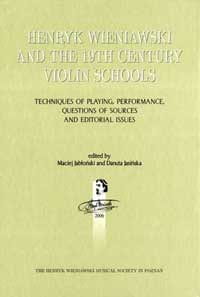 Henryk Wieniawski and the 19th Century Violin Schools is a fascinating book that provides detailed information on a number of great romantic era virtuosi. Besides Wieniawski, the reader will find a riveting discussion of other violinists and their styles of playing, among them Karol Lipiński, Nicolò Paganini, Luis Spohr, Joseph Joachim, Pablo de Sarasate, and many others. This handy volume is an outcome of the Second International Musicological Conference, held in March 2005. Expertly edited by Maciej Jabłoński and Danuta Jasińska, it features descriptions of the various national schools of violin playing (French, Belgian, German, Italian) penned by Robin Stowell, Damien Ehrhardt, Renata Suchowiejko, Luca Aversano, Massimiliano Sala, Roberto Illano, Marcin Wąsowski, Dieter Gutknecht, Klaus Döge, Laszlo Gombos, Pablo Rodriguez and Małgorzata Woźna-Stankiewicz. This hardbound volume contains numerous musical examples, illustrations, and tables and was published by the Henryk Wieniawski Musical Society in Poznań. Being an English language presentation, it is sure to find many eager readers around the world.
Henryk Wieniawski and the 19th Century Violin Schools is a fascinating book that provides detailed information on a number of great romantic era virtuosi. Besides Wieniawski, the reader will find a riveting discussion of other violinists and their styles of playing, among them Karol Lipiński, Nicolò Paganini, Luis Spohr, Joseph Joachim, Pablo de Sarasate, and many others. This handy volume is an outcome of the Second International Musicological Conference, held in March 2005. Expertly edited by Maciej Jabłoński and Danuta Jasińska, it features descriptions of the various national schools of violin playing (French, Belgian, German, Italian) penned by Robin Stowell, Damien Ehrhardt, Renata Suchowiejko, Luca Aversano, Massimiliano Sala, Roberto Illano, Marcin Wąsowski, Dieter Gutknecht, Klaus Döge, Laszlo Gombos, Pablo Rodriguez and Małgorzata Woźna-Stankiewicz. This hardbound volume contains numerous musical examples, illustrations, and tables and was published by the Henryk Wieniawski Musical Society in Poznań. Being an English language presentation, it is sure to find many eager readers around the world.
[MZ]
Ziemski At Calstate Northridge
 The American Guitar Society is pleased to present Maciej Ziemski,guitar w ith Jolanta Ziemska, piano (Poland) on Saturday, March 10 th at California State University – Northridge in the Cypress Hall Recital Hall. A prizewinner of several national and international competitions, Maciej Ziemski has performed, and given radio and television broadcasts, throughout Poland, Germany, Spain, Italy, the Czech Republic, Romania, Denmark, Venezuela, South Korea and the USA. Widely acclaimed for his awe-inspiring technique and first-class musicianship, he will be joined by his wife, concert pianist Jolanta Ziemska. This concert is part of his first tour of the west coast and will feature works by Scarlatti, Boccherini, Chopin, Debussy, Rachmaninov, Brouwer, Dyens and Atilano.
The American Guitar Society is pleased to present Maciej Ziemski,guitar w ith Jolanta Ziemska, piano (Poland) on Saturday, March 10 th at California State University – Northridge in the Cypress Hall Recital Hall. A prizewinner of several national and international competitions, Maciej Ziemski has performed, and given radio and television broadcasts, throughout Poland, Germany, Spain, Italy, the Czech Republic, Romania, Denmark, Venezuela, South Korea and the USA. Widely acclaimed for his awe-inspiring technique and first-class musicianship, he will be joined by his wife, concert pianist Jolanta Ziemska. This concert is part of his first tour of the west coast and will feature works by Scarlatti, Boccherini, Chopin, Debussy, Rachmaninov, Brouwer, Dyens and Atilano.
Saturday, March 10, 2007 | 8:00pm
Recital Hall (Room 158), Cypress Hall (Music Building)
California State University, Northridge
18111 Nordhoff St.
Northridge, CA 91330
Verdehr Premiere Sydor
 The Verdehr Trio returns to the Kosciuszko Foundation Sunday, March 25 at 3 PM, with the premiere of a new Polish work commissioned especially for this concert: Musica per Trio by young Polish composer Pawel Sydor. The program includes the New York premiere of a trio by Margaret Brouwer, and dances of Mozart and Dvorak.
The Verdehr Trio returns to the Kosciuszko Foundation Sunday, March 25 at 3 PM, with the premiere of a new Polish work commissioned especially for this concert: Musica per Trio by young Polish composer Pawel Sydor. The program includes the New York premiere of a trio by Margaret Brouwer, and dances of Mozart and Dvorak.
An acknowledged leader in the field of new music, the Verdehr Trio for over thirty years has concentrated on works for their unusual violin -clarinet -piano ensemble. Over the years, the Trio has created a large repertoire by commissioning over 160 new works from some of the world’s most prominent and exciting composers – -known and unknown, young and old, from this country and abroad. To round out its repertoire with Classical and Romantic works, the Trio has rediscovered as well as transcribed 18th and 19th century pieces for inclusion in its concert programs. The Verdehr Trio is in residence at Michigan State University.
Program: Mozart – Four Dances; Dvorak – Two Slavonic Dances; Margaret Brouwer – Trio for Violin, Clarinet, and Piano* (written for the Verdehr Trio); and Pawel Sydor – Musica per Trio*
* New York Premiere
A Leap From The Temple Of Culture
 On March 15-17 at Columbia University, a conference entitled “A LEAP FROM THE TEMPLE OF CULTURE INTO THE ABYSS: DECADENCE IN CENTRAL AND EASTERN EUROPE” will be held, featuring papers on Leopold Staff, Stanislaw Ignacy Witkiewicz (Witkacy), Stanislaw Przybyszewski, and Polish Decadent Music. Considered the last phase of Romanticism and the first phase of Modernism, in the West Decadence is linked with the names of Charles Baudelaire, Stephane Mallarmé, Paul Verlaine, Joris-Karl Huysmans, and Oscar Wilde. It spread throughout Europe in the 1890s, intermingling with native elements in its new contexts. Serge Diaghilev described Decadence as a leap from the temple of culture into the abyss-that is, a dramatic fall from the heights of civilization into nothingness. Decadence thus creates a myth of culture at its peak in the final days before its sudden perdition. It is an aesthetic that worships art as the highest ideal-an aesthetic of erudition, allusion, artificiality, and literariness. Paradoxically, however, at the same time it also highlights the themes of culture in decline and the degeneration of humanity.
On March 15-17 at Columbia University, a conference entitled “A LEAP FROM THE TEMPLE OF CULTURE INTO THE ABYSS: DECADENCE IN CENTRAL AND EASTERN EUROPE” will be held, featuring papers on Leopold Staff, Stanislaw Ignacy Witkiewicz (Witkacy), Stanislaw Przybyszewski, and Polish Decadent Music. Considered the last phase of Romanticism and the first phase of Modernism, in the West Decadence is linked with the names of Charles Baudelaire, Stephane Mallarmé, Paul Verlaine, Joris-Karl Huysmans, and Oscar Wilde. It spread throughout Europe in the 1890s, intermingling with native elements in its new contexts. Serge Diaghilev described Decadence as a leap from the temple of culture into the abyss-that is, a dramatic fall from the heights of civilization into nothingness. Decadence thus creates a myth of culture at its peak in the final days before its sudden perdition. It is an aesthetic that worships art as the highest ideal-an aesthetic of erudition, allusion, artificiality, and literariness. Paradoxically, however, at the same time it also highlights the themes of culture in decline and the degeneration of humanity.
This conference seeks to foster a nuanced understanding of the manifestations of Decadence in central and eastern European literature, arts, and culture within a comparative context. Speakers at the conference will address questions such as how Decadence is to be understood in the region, how it differs from the Western movement, and how it is manifested in various arts, including literature, art, ballet, and music. Sponsored by: The Harriman Institute of Columbia University, The Department of Slavic Languages of Columbia University, The Department of Slavic Languages and Literatures of the University of California, Berkeley, and The Institute of Slavic, East European, and Eurasian Studies at the University of California, Berkeley, this conference is free and open to the public. For more information please contact Kirsten Lodge at klb57@columbia.edu or Jonathan Stone at jcstone@berkeley.edu. For a full conference program, visit www.polishculture-nyc.org/witkacy_columbia_program.htm
Lutosławski In London
American cellist Ralph Kirshbaum and Swedish pianist Peter Jablonski promise an exciting evening at Queen Elizabeth Hall in London on March 11. A rarity by Lutosławski, Poland ‘s premiere composer in the mid-20th century, opens the second half of this chamber concert. The concert ends with Shostakovich’s only cello sonata, recently recorded by the duo. This is preceded by an all-French first half includes Debussy’s Cello Sonata, full of fantasy and delicacy and Fauré’s late Second Sonata, a journey of inward exploration and expansive élan.
Witold Lutosławski was one of the major composers of the twentieth century. Born in Warsaw in 1913, he showed prodigious musical and intellectual talent from an early age. His composition studies in Warsaw ended at a politically difficult time for Poland so his plans for further study in Paris were replaced by a period which included military training, imprisonment by the Germans and escape back to Warsaw, where he and his compatriot Andrzej Panufnik played in cafes their own compositions and transcriptions.
After the war, the Stalinist regime banned his first symphony (1941-47) as ‘formalist’, but he continued to compose and in 1958 his Musique Funèbre, in memory of Bartok, established his international reputation. He continued to work internationally and amongst the many prizes awarded to him were the UNESCO Prize (1959,1968), the French order of Commandeur des Arts et des Lettres (1982), Grawemeyer Award (1985), Royal Philharmonic Society Gold Medal (1986), in the last year of his life, the Swedish Polar Music Prize and the Inamori Foundation Prize, Kyoto, for his outstanding contribution to contemporary European music, and, posthumously, the International Music Award for best large-scale composition for the fourth symphony. Lutoslawski died in February 1994, at the age of 81.
The full program of the concert includes: Claude Debussy Sonata in D minor for cello and piano; Gabriel Fauré Cello Sonata No.2 in G minor, Op.117; Witold Lutosławski Grave (Metamorphoses) for cello & piano; Dmitry Shostakovich Cello Sonata in D minor, Op.40 (1934)
Chopin Statue In Shanghai
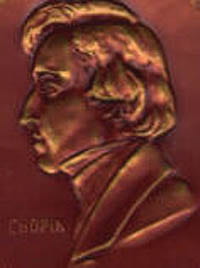 A new statue of Frederic Chopin will be revealed on March 2, 2007 in Sun Yat Sen park in Shanghai, China. The statue is designed by Lu Pin, a graduate of Warsaw Academy of Fine Arts where she studied with prof. Janusz Pastwa. This will be the first statue of Chopin in China and only the second statue of a foreigner in Shanghai. Calisia, a manufacturer of pianos from Kalisz, is currently constructing a concert grand piano on which Polish pianist Piotr Paleczny will perform for the unveiling. Polish authorities are hoping that EXPO 2010 in Shanghai will be partly devoted to Frederic Chopin, as a celebration of 200 th birthday of the composer.
A new statue of Frederic Chopin will be revealed on March 2, 2007 in Sun Yat Sen park in Shanghai, China. The statue is designed by Lu Pin, a graduate of Warsaw Academy of Fine Arts where she studied with prof. Janusz Pastwa. This will be the first statue of Chopin in China and only the second statue of a foreigner in Shanghai. Calisia, a manufacturer of pianos from Kalisz, is currently constructing a concert grand piano on which Polish pianist Piotr Paleczny will perform for the unveiling. Polish authorities are hoping that EXPO 2010 in Shanghai will be partly devoted to Frederic Chopin, as a celebration of 200 th birthday of the composer.
Lu Pin still resides in Poland, since she was invited there 10 years ago by the Center for Cultural Animation. Her sculptures are on display in galleries in Canada and Korea, among others. The idea to create the statue of Chopin came from Lu Pin’s love for his music. Chopin’s music is extremely popular in Asia and the conservatories prepare fantastic Chopin interpreters, as the results of many competitions prove.
Szczecin Opera Sans Director
Marek Sztark, who was the director of the Szczecin Opera has resigned from the position. According to Bogna Bartkowiak, spokesman for the marshal of Szczecin, there were irreconcilable differences of vision for the company’s future between the director and new regional authorities, who are the supervising and financing entity for the opera. There are speculations that Warcisław Kunc, who served as the director of the company from 1992 -2004 will be the next director, but the administration assures that there will be an open competition for the position.
The Pianist Staged
 Nicolas Stavy, renowned French pianist (pictured at right), is performing the lead role in the adaptation of The Pianist by Władysław Szpilman. This theatrical adaptation of Szpilman’s biography is directed by Cécile Guilemont in Théâtre des Bouffes du Nord in Paris. The adaptation is a dialogue between an actor presenting the war experiences of Szpilman and the pianist playing the pieces by Chopin and Szpilman on stage. The premiere took place on February 21, 2007 and the show will be performed until March 17.
Nicolas Stavy, renowned French pianist (pictured at right), is performing the lead role in the adaptation of The Pianist by Władysław Szpilman. This theatrical adaptation of Szpilman’s biography is directed by Cécile Guilemont in Théâtre des Bouffes du Nord in Paris. The adaptation is a dialogue between an actor presenting the war experiences of Szpilman and the pianist playing the pieces by Chopin and Szpilman on stage. The premiere took place on February 21, 2007 and the show will be performed until March 17.
Polish Posters On Display
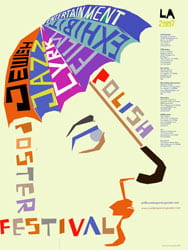 Posters evolved into a highly sophisticated, expressive, and powerful visual art form under the conditions of Communist Poland, and along with avant-garde theater in the same period became one of Poland ‘s most widely admired cultural achievements. In a centralized economy that could subsidize the arts – profits were not key and thus advertising was not geared to selling tickets, and since posters were the main medium through which films, plays, music and other cultural events were publicized, they became a field of employment for artists and graphic designers in which these could exercise a crafty combination of personal creativity and a visual wit too subtle to be of concern to, or even come to the notice of, the censors.
Posters evolved into a highly sophisticated, expressive, and powerful visual art form under the conditions of Communist Poland, and along with avant-garde theater in the same period became one of Poland ‘s most widely admired cultural achievements. In a centralized economy that could subsidize the arts – profits were not key and thus advertising was not geared to selling tickets, and since posters were the main medium through which films, plays, music and other cultural events were publicized, they became a field of employment for artists and graphic designers in which these could exercise a crafty combination of personal creativity and a visual wit too subtle to be of concern to, or even come to the notice of, the censors.
With state financial support and artistic encouragement, the graphic artists of the golden era of the Polish School of Posters (1950s-1980s) designed strong, original, individualistic images – often intended to surprise or disturb the viewers’ assumptions, frequently using commonly understood ironies to communicate surreptitiously and critically about society or even “the system” itself. The best of the posters – created by an extraordinarily large number of brilliantly talented and highly trained artists, among them such world-renowned masters of the art of the poster as Jan Lenica, Henryk Tomaszewski, and Waldemar Swierzy – are visual gems having the compact concision of literature’s pithiest epigrams. It is said that the “Polish School ” of poster art demonstrated a genius not seen in one country since France ‘s La Belle Époque of the 1890s.
Along with its posters on everything from the circus to legendary stars of American jazz, the Polish Poster Festival, in the longest-running of its several venues, puts the spotlight on Polish-Jewish cultural events that were sponsored by the government after 1000 years of vibrant Jewish culture had been effectively destroyed in the Holocaust. These included productions of the E.R. Kaminski National Jewish Theater, and many films, operas, and exhibitions on Jewish themes or by Jewish artists.
CYRK POSTERS
February 17 – March 10, 2007
Opening reception: Sat., Feb. 17, 6-9 PM
Track 16 Gallery
Bergamot Station
2525 Michigan Ave, Bldg C1, Santa Monica, CA 90404
tel. (310) 264-4678
JAZZ POSTERS
February 24 – April 27, 2007
Reception: Sat., Mar. 10, 4-7 PM
The Jazz Bakery
3233 Helms Ave, Los Angeles, CA 90034
tel. (310) 271-9039
JEWISH CULTURE POSTERS
February 25 – May 27, 2007
Reception: Sun., Mar. 11
University of Judaism
15600 Mulholland Drive, Bel Air, CA 90077
tel. (310) 476-9777
FILM, THEATER, OPERA POSTERS
March 15 – May 26, 2007
Weidman Gallery
811 N. La Cienga Blvd., W. Hollywood, CA 90069
Tel. (310) 657-5286
FILM POSTERS
April 21 – May 3, 2007
Polish Film Festival LA
& Los Angeles Jewish Film Festival
Laemmle’s Sunset 5 Theatre
8000 Sunset Blvd., W. Hollywood, CA 90046
tel. (323) 848-3500
EXHIBITION POSTERS
April 26 – May 17, 2007
Voila! Gallery
332 1/2 N. La Brea Ave, Los Angeles, CA 90036
tel. (323) 954-0418
OTHER SELECTED POSTERS ON DISPLAY AT:
Warszawa Restaurant
1414 Lincoln Blvd., Santa Monica, CA 90401
tel. (310) 393-8831
Bar Lubitsch
7720 Santa Monica Blvd., W. Hollywood, CA 90048
Awards
Lutosławski Competition Results
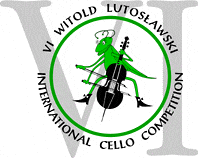 The 6th edition of the International Lutosławski Cello Competition has just ended and there is some good news. Polish artists continue to impress international juries and this time it was 20 year old Marcin Zdunik who got the main prize as well as the Grand Prix for the outstanding performance of Lutoslawski`s Cello Concerto. Marcin Zdunik is in his first year of studies at the Frederic Chopin Music Academy in Warsaw with prof. Adam Bauer. 2nd place was given ex aequoto Lionel Cottet (Switzerland) and Paul Wiancko (USA). The 3rd prize went to Adam Krzeszowiec (Poland).
The 6th edition of the International Lutosławski Cello Competition has just ended and there is some good news. Polish artists continue to impress international juries and this time it was 20 year old Marcin Zdunik who got the main prize as well as the Grand Prix for the outstanding performance of Lutoslawski`s Cello Concerto. Marcin Zdunik is in his first year of studies at the Frederic Chopin Music Academy in Warsaw with prof. Adam Bauer. 2nd place was given ex aequoto Lionel Cottet (Switzerland) and Paul Wiancko (USA). The 3rd prize went to Adam Krzeszowiec (Poland).
The Lutosławski Competition is the only one in Europe where the age limit is set to a low 24, and therefore the competition is truly geared toward promoting young and upcoming artists. The jury was led Polish conductor Kazimierz Kord and the finals were accompanied by the Polish Radio Orchestra, conducted by Massimiliano Caldi. In all there were 45 contestants from USA, Switzerland, Korea, China, Holland, Czech, Canada and Poland.
Musica Sacra Results
 The jury of the 3rd International “Musica Sacra” Composer’s Competition has announced the awards. The 1st prize went to Michał Łukasz Niżyński (Poland) for Sub tuum praesidium. 2nd prize was given to Staephen Nicolay (France) for In Galilea est Dominus. 3rd prize went to Cristian Gentilini (Italy) for Cantantibus organis and the 4th to Kamil Kosecki (Poland) for Lacrimosa. Kamil Kosecki has also received a special award presented by Polish Music Editions (PWM). Apart from the monetary awards, all the works will be premiered during the “Gaude Mater” Festival in Częstochowa, Poland. The competition was co-organized by the Trinity College in Cambridge and the jury consisted of: Marian Borkowski (Poland) –chairman, Stephen Layton (Great Britain), Jan Łukaszewski (Poland), Chifuru Matsubara (Japan), Vytautas Miŝkinis (Lithuania) and Paul Wingfield (Great Britain). There were 45 entries sent from Argentina, Austria, Belarus, France Greece, Spain, Korea, Germany, Poland, Ukraine, USA, Great Britain and Italy.
The jury of the 3rd International “Musica Sacra” Composer’s Competition has announced the awards. The 1st prize went to Michał Łukasz Niżyński (Poland) for Sub tuum praesidium. 2nd prize was given to Staephen Nicolay (France) for In Galilea est Dominus. 3rd prize went to Cristian Gentilini (Italy) for Cantantibus organis and the 4th to Kamil Kosecki (Poland) for Lacrimosa. Kamil Kosecki has also received a special award presented by Polish Music Editions (PWM). Apart from the monetary awards, all the works will be premiered during the “Gaude Mater” Festival in Częstochowa, Poland. The competition was co-organized by the Trinity College in Cambridge and the jury consisted of: Marian Borkowski (Poland) –chairman, Stephen Layton (Great Britain), Jan Łukaszewski (Poland), Chifuru Matsubara (Japan), Vytautas Miŝkinis (Lithuania) and Paul Wingfield (Great Britain). There were 45 entries sent from Argentina, Austria, Belarus, France Greece, Spain, Korea, Germany, Poland, Ukraine, USA, Great Britain and Italy.
Accolades For DUX
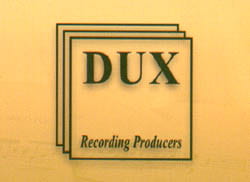 The Polish recording label DUX has received 5 stars from Goldberg Magazine (December 2006 issue) for its album Musica Figurata in Wrocław and Silesia in the 14th and 15th centuries (DUX 0478), recorded by Ars Cantus with Tomasz Dobrzański. According to the reviewer Craig Zeichner of Goldberg Magazine, “The precision and beauty of the singing heard throughout this recording wins high marks because this isn’t easy music and performances could easily lapse into dullness, but that’s never the case here. The same can be said for the instrumentalists… This is another superb recording from the always interesting Warsaw-based Dux label, one of the finest early music labels on the scene.” (Read the full review here.)
The Polish recording label DUX has received 5 stars from Goldberg Magazine (December 2006 issue) for its album Musica Figurata in Wrocław and Silesia in the 14th and 15th centuries (DUX 0478), recorded by Ars Cantus with Tomasz Dobrzański. According to the reviewer Craig Zeichner of Goldberg Magazine, “The precision and beauty of the singing heard throughout this recording wins high marks because this isn’t easy music and performances could easily lapse into dullness, but that’s never the case here. The same can be said for the instrumentalists… This is another superb recording from the always interesting Warsaw-based Dux label, one of the finest early music labels on the scene.” (Read the full review here.)
Also in the same month, Polish music of 20th century for violin and piano (DUX 0544), featuring Patrycja Piekutowska-violon and Beata Bilinska-piano, won Pizzicato Magazine’s Supersonic Award and Witold Lutosławski-Symphonies (DUX 0506), featuring The Silesian Philharmonic Symphony Orchestra with Mirosław Jacek Błaszczyk, conductor won the Exceptional/Scherzo Award.
Medal Of Merit For Biret
The President of Poland, Lech Kaczyński, presented Turkish pianist Idil Biret with the “Medal of Merit of the Republic of Poland” at the Polish Embassy in Ankara during a state visit on 23 January 2007, “for her outstanding efforts in spreading the music of Chopin throughout the world with her recordings and performances of the composer’s work”. At the age of seven, a special law was passed by the Turkish parliament which enabled Birit to study abroad, and so she was given the opportunity to study at the Paris Conservatory in France under the tutelage of Nadia Boulanger. From there, she went on to study with Alfred Cortot and Wilhelm Kempf, of whom she became a lifelong disciple and favorite student. Biret’s 1995 recordings of Chopin’s entire oeuvre for Naxos Records were awarded the “Grand Prix du Disque Frédéric Chopin” in Poland.
Penderecka Honored By Lithuania
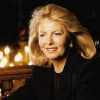 Animator of cultural life in Poland and wife of composer Krzysztof Penderecki, Elżbieta Penderecka has received an Officer’s Cross of Lithuanian Republic, in honor of her efforts to promote the culture of Lithuania in Poland. The award was given to Mrs. Penderecka and 18 other artists by president Valdas Adamkus and presented by the Lithuanian ambassador in Poland, Egidijus Meilunas. Another reason for the awards was the celebration of the 15th anniversary of renewed diplomatic relationship between Poland and Lithuania.
Animator of cultural life in Poland and wife of composer Krzysztof Penderecki, Elżbieta Penderecka has received an Officer’s Cross of Lithuanian Republic, in honor of her efforts to promote the culture of Lithuania in Poland. The award was given to Mrs. Penderecka and 18 other artists by president Valdas Adamkus and presented by the Lithuanian ambassador in Poland, Egidijus Meilunas. Another reason for the awards was the celebration of the 15th anniversary of renewed diplomatic relationship between Poland and Lithuania.
Młoda Polska Stipend
 Agata Szymczewska, the winner of the International Wieniawski Violin Competition has received a Minister of Culture “Młoda Polska” [Young Poland] Stipend. The cash award is given to support the artistic endeavors of outstanding Polish artists. In 2006 there were 332 artists applying for the stipend, only 72 have received the award. Among the receivers are violinist Agata Szymczewska, guitarist Janko Raseta, painter Wojciech Gilewicz and director Anna Jadowska. For more information about the award and winners please visit the official website of Narodowe Centrum Kultury [National Culture Centre].
Agata Szymczewska, the winner of the International Wieniawski Violin Competition has received a Minister of Culture “Młoda Polska” [Young Poland] Stipend. The cash award is given to support the artistic endeavors of outstanding Polish artists. In 2006 there were 332 artists applying for the stipend, only 72 have received the award. Among the receivers are violinist Agata Szymczewska, guitarist Janko Raseta, painter Wojciech Gilewicz and director Anna Jadowska. For more information about the award and winners please visit the official website of Narodowe Centrum Kultury [National Culture Centre].
Polish Pianist Awarded
Krzysztof Dysz, a pianist from Poznań, has won the 3rd prize at the 7 th International Scriabin Piano Competition in Paris. The jury was led by internationally acclaimed interpreter of Scriabin’s music, Michail Woskriesienski. Krzysztof Dysz studies piano with Anna Organiszczak at Poznań Music Academy.
Young Guitar Hero
14 year old guitarist Marcin Kuźniar from Kraków, has won the first prize in the category age limited to 14 at the 8 th Guitar Art Festival in Belgrad. The young artist has already won international acclaim in Italy at the Citta di Barletta competition for young musicians. He is a student at the Żeleński Music School in Kraków in a class of Włodzimierz Lerner.
Fryderyki 2006
Fryderyk 2006 – Nominations
 The Polish Society of the Phonographic Industry (ZPAV), comprised of nearly 800 performing artists, record industry professionals, and music journalists, acts as the jury for the Fryderyk Awards, music awards presented in over 20 pop, classical and jazz categories. It was founded in December 1999 at the initiative of ZPAV members to honor artists nominated to the Fryderyk Awards.
The Polish Society of the Phonographic Industry (ZPAV), comprised of nearly 800 performing artists, record industry professionals, and music journalists, acts as the jury for the Fryderyk Awards, music awards presented in over 20 pop, classical and jazz categories. It was founded in December 1999 at the initiative of ZPAV members to honor artists nominated to the Fryderyk Awards.
Below you will find nominees for 2006 in Classical and Jazz categories:
Classical Music
Album of the year – Early Music
- Jasnogórska muzyka dawna. Musica Claromontana vol. 13 (DUX)
- Musica Divina (Muzyka z XV w. Rękopisu Krasińskich) SACD& CD (BeArTon)
- Muzyka polskiego średniowiecza (Travers)
Album of the year – Chamber Music
- Astor PIAZZOLLA: Piazzoforte, Kevin Kenner (DUX)
- Polska Muzyka Kameralna – SACD & CD (BeArTon)
- The Best of Zarębski (Kwintet fortepianowy op. 34, “Róże i ciernie” op.13, „Grande Polonaise” op. 6) SACD&CD (BeArTon)
- Henryk WIENIAWSKI; Józef WIENIAWSKI: Violin And Piano Works (DUX)
- Juliusz ZARĘBSKI & Grażyna BACEWICZ (DUX)
Album of the year – Orchestral Music
- KARŁOWICZ – Pieśni i utwory kameralne (Polskie Radio SA)
- MORYTO, SHOSTAKOVICH (DUX)
- MOZART – koncerty na 1, 2 i 3 fortepiany (Polskie Radio SA)
- MOZART – Piano Concertos No. 17 & 20 – Piotr Anderszewski (EMI Music Poland)
- POŁOŃSKI, Dominik – wiolonczela (Polskie Radio SA)
Album of the year – Solo Music
- Wielkie Organy Archikatedry w Gdańsku Oliwie (Soliton)
- XIII Międzynarodowy Konkurs Skrzypcowy im. Henryka Wieniawskiego – Kronika Konkursu Vol. 7 (DUX)
- XIII Międzynarodowy Konkurs Skrzypcowy im. Henryka Wieniawskiego – Kronika Konkursu Vol. 12 (DUX)
Album of the year – Vocal Music
- Ave Maria w Bazylice Mariackiej w Krakowie (DUX)
- Magnificate et Glorificate Dominum
- Polish Songs (DUX)
- Władysław ŻELEŃSKI – Pieśni (Polskie Radio SA)
Album of the year – Contemporary Music
- AUKSO gra utwory Kilara (Radio Katowice SA)
- BAIRD, ŁUKASZEWSKI, BŁAŻEWICZ, BORKOWSKI (Musica Sacra Edition)
- Henryk Mikołaj GÓRECKI: III Symfonia “Symfonia pieśni żałosnych”. Dzieła Narodowe w nagraniu NOSPR (Polskie Radio SA)
- Wojciech KILAR: Missa pro pace. Dzieła Narodowe w nagraniu NOSPR (Polskie Radio SA)
Wojciech ŁUKASZEWSKI – Nazywam ciebie morze (Musica Sacra Edition)
Album of the year – Archival Recording
- Henryk CZYŻ w serii “Dyrygenci polscy” (album 2 CD) (Polskie Radio SA)
- Krystyna SZOSTEK-RADKOWA (album 5 CD) (Polskie Radio SA)
Teresa ŻYLIS-GARA – Arie operowe (Polskie Nagrania MUZA)
Outstanding Recording of Polish Music
- AUKSO gra utwory Kilara (Radio Katowice SA)
BAIRD, ŁUKASZEWSKI, BŁAŻEWICZ, BORKOWSKI (Musica Sacra Edition) - Henryk Mikołaj GÓRECKI: III Symfonia “Symfonia pieśni żałosnych”. Dzieła Narodowe w nagraniu NOSPR (Polskie Radio SA)
Polska Muzyka Kameralna – SACD & CD (BeArTon) - Works for Piano (EMI Music Poland)
- Władysław ŻELEŃSKI – Pieśni (Polskie Radio SA)
Jazz
Jazz Album of the Year
- WŁODEK PAWLIK TRIO (5LINE) – Anhelli
- MACIEJ SIKAŁA (BCD Records) – Another One For…
- ZBIGNIEW NAMYSŁOWSKI QUINTET (BKQ) – Assymetry
- JAZZ COMBO Jarka Śmietany, Chamber Orchestra of Galicia (JSR) – Autumn suite
- TOMASZ STAŃKO (ECM/Universal Music Polska) – Lontano
Jazz Musician of the Year
Discography
New Transkapela Release
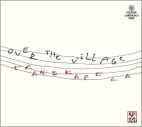 In January 2007, Over The Village, a new record by the Polish group Transkapela, was released. After the success of their first album, Sounds & Shadows, which was rewarded with a title of the best Polish folk record 2005 year in the Polish Radio “Folk Phonogram of the Year Award” record competition, it is time for the next disc of the band.
In January 2007, Over The Village, a new record by the Polish group Transkapela, was released. After the success of their first album, Sounds & Shadows, which was rewarded with a title of the best Polish folk record 2005 year in the Polish Radio “Folk Phonogram of the Year Award” record competition, it is time for the next disc of the band.
Over The Village is a continuation of Transkapela’s musical imaginings of the time of Carpathian Klezmers. The musicians of Transkapela once again reach down to the roots of Carpathian music, searching once more for the trace of the village klezmers and their musical splendor, as they played solo and as ensembles in village weddings, religious holidays and festivities.
Over The Village is a sort of metaphysical story about the Carpathian village, which was in the old days inhabited by Bukovina highlanders, Hutsuls, Jews, Gypsies, Polish, Romanians, Hungarians and many more from the abundance of the Transcarpathian cultures. This musical stroll on the village path is an attempt to experience the truth about the past, not by understanding intellectually but instinctively, by touching the existing sound and melody.
Transkapela includes Ewa Wasilewska – violin, mazanki – little fiddle; Maciej Filipczuk – violin, fiddle with trumpet, guitar/zongura; Robert Wasilewski – hammered dulcimer, viola, shepherd’s pipes, jew’s harp, guitar /zongura; and Piotr Pniewski – cello, double bass, drum, gardon. This album was released by Ferment Music Demonstrations with the assistance of Polish Radio.
Chopin By Yundi Li
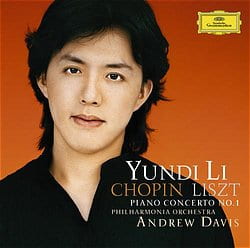 Yundi Li – Liszt, Chopin
Yundi Li – Liszt, Chopin
Franz Liszt: Piano Concerto No. 1; Frederic Chopin: Piano Concerto No. 1
Yundi Li – piano; Philharmonia Orchestra; Andrew Davis – conductor
DG 477 640-2
Yundi Li was the winner of the International Chopin Piano Competition in Warsaw in 2000. As a result Yundi Li has signed a contract with Deutsche Grammophon and just recently has released a new CD with Liszt and Chopin works. “Mr. Li is a poetic player with a sensitive touch (but also ample power when he needs it), as well as an ear for textural clarity and an impeccable sense of line. Those qualities, notable on his handful of recordings for Deutsche Grammophon, served the Chopin perfectly.” – The New York Times (2005)
This disk has won Gramophone Magazine ‘s Editor’s Choice Award, editor James Inverne’s selection of the10 most outstanding recordings out of the 100s reviewed each month, for March 2007.
New From DUX
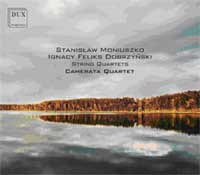 Stanisław Moniuszko/Ignacy Feliks Dobrzyński –
Stanisław Moniuszko/Ignacy Feliks Dobrzyński –
String Quartets
Dobrzyński (1807-1867) – String Quartet No. 1 in E minor Op. 7; Moniuszko (1819-1872) – String Quartet No. 2 in F major, String Quartet No. 1 in D minor
Camerata Quartet: Włodzimierz Promiński – 1st Violin; Andrzej Kordykiewicz – 2nd Violin; Piotr Reichert – viola; Roman Hoffmann – cello
DUX 0561
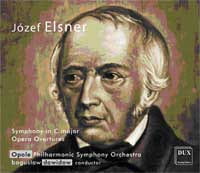 Józef ELSNER
Józef ELSNER
Elsner (1769-1854) – Symphony in C major Op.11, Overture to the opera Andromeda, Overture to the opera The Echo in the Wood (arr. Jerzy Młodziejowski), Overture to the opera Leszek the White (arr. Grzegorz Fitelberg), Overture to the opera Sultan Vampum
Opole Philharmonic Symphony Orchestra, Bogusław Dawidow – conductor
DUX 0568
Album Polski
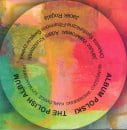 Album Polski (Vol. 2)
Album Polski (Vol. 2)
Stanisław Moniuszko: Mazur from opera Jawnuta ; Henryk Wieniawski: Legend Op. 17; Mieczysław Karłowicz: Lethuanian Rhapsody Op. 11, Pieśni ; Karol Szymanowski: Nocturne, Tarantella
Janusz Wawroński – violin, Adam Kruszewski – baritone, Filharmonia Świętokrzyska Symphonic Orchestra, Jacek Rogala – conductor
Filharmonia Świętokrzyska CD
This is a second CD in a series of releases dedicated entirely to Polish music. The music on this CD comes from the 19th and early 20th centuries and is representative of Polish musical style at the time. The songs by Karłowicz were written for piano and voice but were orchestrated for the recording by Jacek Rogala.
Performances
Podleś Triumphant In Seattle
Ewa Podleś continues to astound audiences with her amazing vocal range and penetrating stage presence. Her current project with the Seattle Opera, performing her signature role as Caesar in Handel’s Julius Caesar is no exception. In her concert review, entitled Hail Caesar: Contralto reigns gloriously, Seattle Times music critic Melinda Bargreen sums up Ewa Podleś’s success very succinctly: “Ewa Podleś, a contralto of amazing power and agility, took command of the title role in Handel’s Julius Caesar the way Caesar himself took command of his legions.” To read the whole review, please visit: seattletimes.nwsource.com/html/artsentertainment/2003589387_opera26.html. (Oher reviews available at www.oregonlive.com and seattlepi.nwsource.com)
Seattle Opera’s production of Julius Caesar will continue through March 10th, with matinee and evening performances. Please see the company website for details.
Anderszewski At Carnegie
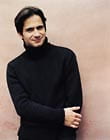 New York ‘s The Sun reviewer Jay Nordlinger concluded his February 26 th review of Piotr Anderszewski’s Carnegie Hall recital at with these words: “…[W]hat superb playing it was! Mr. Anderszewski was exquisite in the Szymanowski, coloring like a pro. These pieces were so interesting musically, you almost failed to notice the pianist’s incredible virtuosity.” To read the whole article about Anderszewski’s exquisite rendering of Beethoven and Szymanowski, visit www.nysun.com/article/49309?access=780944.
New York ‘s The Sun reviewer Jay Nordlinger concluded his February 26 th review of Piotr Anderszewski’s Carnegie Hall recital at with these words: “…[W]hat superb playing it was! Mr. Anderszewski was exquisite in the Szymanowski, coloring like a pro. These pieces were so interesting musically, you almost failed to notice the pianist’s incredible virtuosity.” To read the whole article about Anderszewski’s exquisite rendering of Beethoven and Szymanowski, visit www.nysun.com/article/49309?access=780944.
Halka In Florida
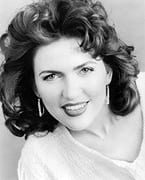 As part of its 2007 Winter Opera Festival, the Sarasota Opera is presenting Stanisław Moniuszko’s Halka during February and the beginning of March. According to Sarasota Herald-Tribunecorrespondent Gayle Williams, “Sarasota Opera has struck gold with the rarely heard Halka... [It is f]illed with thoroughly delightful music infused with the spirit of Polish folk tunes and dance forms.” (Read the whole article at www.heraldtribune.com) Maria Knapik (pictured at left), a Polish-Canadian soprano who is singing the title role, is very proud to be a part of this operatic presentation of her heritage and says this about the historical context of the opera: “‘In this opera you will see people longing for liberty, for freedom,'” Knapik said. “‘But you will not see it openly because Poland was under oppression. Nothing of these emotions could really be demonstrated because they could not get past the censors.” (From the St. Petersburg Times, as reviewed by Jaohn Fleming)
As part of its 2007 Winter Opera Festival, the Sarasota Opera is presenting Stanisław Moniuszko’s Halka during February and the beginning of March. According to Sarasota Herald-Tribunecorrespondent Gayle Williams, “Sarasota Opera has struck gold with the rarely heard Halka... [It is f]illed with thoroughly delightful music infused with the spirit of Polish folk tunes and dance forms.” (Read the whole article at www.heraldtribune.com) Maria Knapik (pictured at left), a Polish-Canadian soprano who is singing the title role, is very proud to be a part of this operatic presentation of her heritage and says this about the historical context of the opera: “‘In this opera you will see people longing for liberty, for freedom,'” Knapik said. “‘But you will not see it openly because Poland was under oppression. Nothing of these emotions could really be demonstrated because they could not get past the censors.” (From the St. Petersburg Times, as reviewed by Jaohn Fleming)
In addition to the opera, arts organizations throughout Sarasota, with the assistance of the Polish Embassy, celebrated Poland and its arts with special exhibits and presentations throughout the month of February. To see a full listing of the events included in the celebration of Polish culture in Sarasota, see last month’s Newsletter at: www.usc.edu/dept/polish_music/news/feb07.html#sarasota.
Stojowski Collection Update
In 2005, the Polish Music Center at USC received a generous donation of manuscripts, sketches, correspondence, and published scores of music by Zygmunt (Sigismond) Stojowski (1870-1946) from the composer’s family. Now known as the Zygmunt & Luisa Stojowski Collection, this new addition to the PM archive consists of 32 boxes of varying sizes. During the summer of 2005, the Stojowski Collection was appraised by a specially hired expert. Although study copies will remain in the Polish Music Center, the originals will reside permanently in Special Collections at the Doheny Library on the USC campus. In the coming months, as the Collection’s detailed inventory is being made, we will continue publishing the contents in our Newsletter, informing our public of this important legacy left by a fascinating and undeservedly forgotten composer. All inquiries regarding the Stojowski Collection should be directed to the Polish Music Center at USC via e-mail to: polmusic@thornton.usc.edu. The following is our report on the contents of Box XI and XII of the Stojowski Collection.
[MZ]
Box 11: Books & Scores
- NOUVEAU DICTIONNAIRE DE POCHE—Français et Allemand. Vol. 1. Leipzig : B.G. Teubner, 1886
- NOUVEAU DICTIONNAIRE DE POCHE —Français et Allemand. Vol. 1. Leipzig: B.G. Teubner, Paris: Haar & Steinert
- NOUVEAU DICTIONNAIRE DE POCHE—Italien- Français. Milan, Casa Editrice Bietti, 1910
- GUIDE DE CONVERSATION Français—Allemand. Paris : Editions Garnier
- Pietro Motti: GRAMMAIRE ITALIENNE. Jules Groos, Ed. Heidelberg, 1925
- Romain Rolland: VIES DES HOMMES ILLUSTRES: BEETHOVEN. Cahiers de la Quinzaine, Paris
- Gustav Kobbe: Ring of the Nibelung.Sixth edition, New York, Schirmer, 1894
- S. Schubert: Katechismus der Musikinstrumente. Leipzig 1882
- Felix Weingartner: Die Symphonie nach Beethoven. S. Fischer Verlag, Berlin 1901
- Robert Musiol: Katechismus der Musikgeschichte. J.J. Weber, Leipzig, 1888
- Hortense Parent: Repertoire encyclopedique du pianiste. Vol. 2 Librairie Hachette, Paris. Includes a handwritten inscription with dedication to S. Stojowski from the author.
- Paul Landormy: Histoire de la musique. Librairie Paul Delaplane, Paris, 1911
- Karl Storck: Das Opernbuch. Stuttgart
- Theodor Billroth: Wer ist musikalisch? Berlin 1895
- J. Henderson: How Music Developed. Third edition. Frederick Stokes Co. New York, 1898
- Carl Van Vechten: The Music of Spain. Alfred A Knopf, NY, 1918
- Henry T. Finck: Songs and Song Writers. Fourth edition. Scribner & Sons, NY 1911
- William Foster Apthorp: The Opera Past and Present. Scribner & Sons, NY 1910
- Annie W. Patterson: Schumann. Dent & Co. London and New York, 1908
- Felix Weingartner: Symphony Writers Since Beethoven. W. Reeves, London
- Pierre Key: Pierre Key’s Music Year Book. 1935 Edition. Key Publishing Co. New York
- Jaques-Dalcroze: Le rhythme, la musique, et l’education. Librairie Fischbacher, Paris 1920
- Nicolas Rimsky-Korsakow: Principes d’orchestration, 1. Max Eschig, Paris, 1914
- Nicolas Rimsky-Korsakow: Principes d’orchestration, Vol. 2. Max Eschig, Paris, 1914
- T. Ferris: Great Musical Composers: German, French, and Italian. Walter Scott Publishing, London and Feeling-on-Tyne
- No listed author. Lohengrin (in French). Hardbound
- Hans von Wolzogen. Thematic Guide through the Music of Parsifal. Schirmer, New York, 1891
- Hubert H. Parry: The Evolution of the Art of Music. Appleton and Co. New York and London, 1912
- Juliusz Słowacki: The Father of the Plague-Stricken at El Arish. Eyre and Spottiswoode Limited, London
- Felix Adler. The Sources of Undying Inspiration. American Ethical Union, New York. Incomplete (16 pages only)
- Woldemar Schnee’s Hand-Training for Musician and Music-Student. Translated by C.M. Hook. Julius Lehman, Berlin
- Jean Marnold: Musique d’autrefois et d’aujourd’hui. Dorbon-Aine, Paris ? Very fragile condition with loose pages and no cover
- Jules Combarieu: La musique—ses lois, son evolution. Flammarion, Paris, 1907
- Giuseppe Verdi: Requiem. Piano-vocal score. Schirmer, New York. 1895
- Ludwig van Beethoven: Sämtliche Streich-Quartette. Pocket score. Editions Eulenburg, Leipzig 1895
- Claude Debussy: 1er Quatour. Pocket score Durand, Paris
- Ludwig van Beethoven: The 32 Piano Sonatas. 3. Lea Pocket Scores
- Ludwig van Beethoven: The 32 Piano Sonatas. 4. Lea Pocket Scores
- Ludwig van Beethoven: The 32 Piano Sonatas. 5. Lea Pocket Scores
- Robert Schumann: Davidsbündlertänze, Toccata, Kinderszenen, Kreisleriana, Humoresque. Lea Pocket Scores
- Robert Schumann: Carnaval, Fantasiestücke, Symphonic Etudes, Fantasia. Lea Pocket Scores
- Paul Juon: Piano Quartet no. 2. Schlesinger/Lienau, Berlin, 1912
Box 12: Photographs, Concert Programs, Press Clippings, And Sound Recordings
- Folder no. 1 : Various concert programs (Carnegie Hall, Avery Fisher Hall, The Town Hall, the 92 nd St. Y, Hunter College, Metropolitan Opera, etc)
- Folder no. 2: Various clippings (mostly concert reviews) in English
- Folder no. 3: Various clippings in Spanish (mostly about Peru) and in Polish (clipping on Żeleński)
- Envelope no. 1: Numerous photographs (various sizes), including: Stojowski Wedding photos, “Farewell Dinner, His Grace Archbishop Jan Cieplak, Hotel Astor, February 1926,” [very fragile], “Madame Marie Jordan de Stojowski (1924) d. 1925,” family photos, numerous photos of Luisa Morales Macedo from the 1910s, various passport-sized photos, a photo of Stojowski with a group of students from his Master Class, a postcard with photo of Clara Schumann, 2 photos of Guiomar Noaves (one inscribed and signed), photo of “ Phyllida, June 1936,” Irene Ruppert, March 14, 1940,” “Edward Beck,” photo of Maria Safonoff (inscribed in French), “Ann Everingham Evans,” “Mildred Titcomb ” (with inscription), etc.
- Sound Recordings:
- Six 7-inch reels with no program/performer information (some have “Luisa Stojowska” some have a date)
- Entrevista y recital piano, Mme Stojowska. 21/9/53. 35 min. Radio San Sebastian.
- One 7 in. reel
- Tatra Album (4 hands); Polish Folk Dances. 3/12/60. 12 min. One 7 in. reel
- Stojowski: Six songs from opp. 11 and 31. Mary Ellen Pracht, soprano; Frank Cooper, piano. Performed at the Fourth Annual Romantic Music Festival at Butler University, Indianapolis, Indiana – May 20, 1971. One 7 in. reel
- Two 11 in. reels, marked “Tape 14 2/20/73” and “Tape 15, 2/20/73”
- Two 11 in. reels. No identifying information on program/performer
- One 4.5 in. reel. No identifying information on program/performer
- One 6 in. reel of tape in a paper bag. No identifying information on program/performer
- One 6.5 mini LP. No identifying information on program/performer
- One 6.5 mini LP. WNYC-FM, May 13, 1951. “Sigismond Stojowski Program. Excerpt from Soir d’Ete (Stojowski), Barbara Chaplain; and excerpt from Melody Op. 1 no. 1 (Stojowski)”
Anniversaries
Born This Month
- 1 March 1810 – Fryderyk Chopin, virtuoso pianist, Poland’s greatest composer
- 2 March 1927 – Witold Szalonek, composer (d. 2001).
- 3 March 1922 – Kazimierz Serocki, composer, co-founder of the Warsaw AutumnFestival
- 6 March 1785 – Karol Kurpinski, composer, father of national opera
- 6 March 1835 – Ludwik Grossman, composer, pianist, and piano merchant (d. 1915)
- 7 March 1911 – Stefan Kisielewski, composer, essayist, writer
- 10 March 1937 – Bernadetta Matuszczak, composer
- 14 March 1913 – Witold Rudzinski, composer
- 17 March 1901 – Piotr Perkowski, composer
- 17 March 1925 – Tadeusz Prejzner, composer, pianist active in popular music
- 18 March 1961 – Hanna Kulenty, composer
- 21 March 1936 – Marek Stachowski, composer
- 23 March 1933 – Andrzej Trzaskowski, composer, jazz pianist and conductor
- 23 March 1888 – Lidia Kmitowa, violinist and teacher (d. 1980)
- 27 March 1927 – Joachim Olkusnik, composer
- 28 March 1954 – Pawel Szymanski, composer
Died This Month
- 1 March 2004 – Janina Garscia, composer of music for children and teacher
- 2 March 1887 – Wilhelm Troschel, singer and son of piano maker
- 4 March 1939 – Józef Sliwinski, pianist, composer (b. 1862)
- 4 March 1925 – Maurycy (Moritz) Moszkowski, composer and pianist (b. 1854)
- 4 March 1895 – Stanislaw Niedzielski, singer (baritone), choral conductor.
- 14 March 1954 – Ludomir Rogowski (b. 3 Oct 1881)
- 15 March 1883 – Karol Studzinski, violinist (b. 1828)
- 15 March 1948 – Konrad Neuger, conductor, active in the U.S. since 1931 (b. 1890)
- 19 March 1876 – Józef Stefani, composer, conductor, violinist, son of Jan (b. 1800)
- 21 March 1973 – Antoni Szalowski, composer
- 22 March 1893 – Adam Herman Hermanowski, cellist, child prodigy and virtuoso (b. 1836)
- 29 March 1937 – Karol Szymanowski, composer, pianist (b. 1882)
- 29 March 1959 – Zdzislaw Szulc, curator of music instruments museum in Poznan
- 31 March 1880 – Henryk Wieniawski, composer, virtuoso violinist (b. 1835)
- 31 March 1946 – Aleksandra Stromfeld-Klamzynska-Szuminska, soprano (b. 1859)

